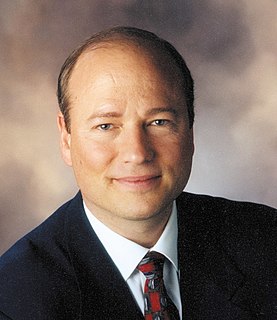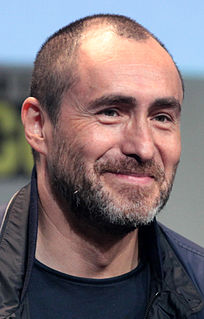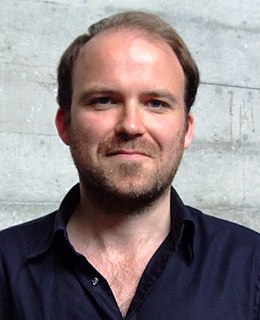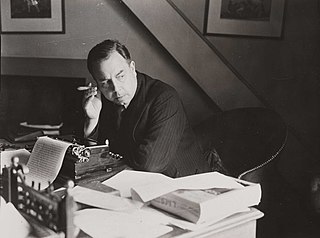A Quote by Marc Maron
Once I learned how to talk, personally, by myself to any number of people, which means do radio without talking to anyone in particular on the air - I just found that my brain became very free to engage in a sort of stream-of-consciousness style of doing what I do.
Related Quotes
Consciousness... does not appear to itself chopped up in bits. Such words as 'chain' or 'train' do not describe it fitly as it presents itself in the first instance. It is nothing jointed; it flows. A 'river' or a 'stream' are the metaphors by which it is most naturally described. In talking of it hereafter, let us call it the stream of thought, of consciousness, or of subjective life. Source of the expression 'stream of consciousness'.
I think there's just been this "thing" that's developed, this way that we have of talking about our music that alienates people. And I fall into that too! I learned that in graduate school. You just talk about your music in a specific way, and that separates people from you. But some composers like that. Schoenberg liked that. He wanted to feel that he was making music for an elite few. That's fine for him, but I want to set myself free from that sort of attitude.
I have skipped from style to style from film to film, and I love doing that because it's given me the ability to free myself from the past. Perhaps one of the worst feelings that I can have is the feeling that I'm locked in, like a prisoner of myself, which is something we all feel at some point in our lives. So part of making those stylistic jumps is just to free myself up-to get away from the old or the old Oliver Stone.
In the field of consciousness research-and also in physics and astronomy-we are breaking past the cause-and-effect, mechanistic way of interpreting things. In the biological sciences, there is a vitalism coming in that goes much further toward positing a common universal consciousness of which our brain is simply an organ. Consciousness does not come from the brain. The brain is an organ of consciousness. It focuses consciousness and pulls it in and directs it through a time and space field. But the antecedent of that is the universal consciousness of which we are all just a part.
I think, at some level, we see young people all over the country mobilizing around different issues, in which they're doing something that I haven't seen for a long time. And that is, they're linking issues together. You can't talk about police violence without talking about the militarization of society in general. You can't talk about the assault on public education unless you talk about the way in which capitalism defunds all public goods. You can't talk about the prison system without talking about widespread racism. You can't do that. They're making those connections.
Since functional brain imaging first emerged, we have learned that there aren't very many brain regions uniquely responsible for specific tasks; most complex tasks engage many if not all of the brain's major networks. So it is fairly hard to make general psychological inferences just from brain data.
People say that the brain is a muscle and that one of the best exercises for any brain is learning another language and to switch from one to another as much as you can. I've found out that when I have trouble regarding any character or any particular scene in English, sometimes I'll switch to Spanish and I'll solve the problem that I've encountered. If I'm working in Spanish and I don't know how to approach certain scenes or certain emotions, or how to say this and that, I just switch to English to try to solve it that way and it works.
There are a lot of actors out there who are able to engage with something in themselves which isn't necessarily their brain. But personally I find it very intellectually satisfying: doing your research and then burrowing as deeply into character as you can. I'm a naturally inquisitive person, too, and acting does feed into that.
On the 1st of August, 1774, I endeavoured to extract air from mercurius calcinates per se [mercury oxide]; and I presently found that, by means of this lens, air was expelled from it very readily. … I admitted water to it [the extracted air], and found that it was not imbibed by it. But what surprized me more than I can well express, was, that a candle burned in this air with a remarkably vigorous flame… I was utterly at a loss how to account for it.
If you're up there [on stage] thinking about what you're doing, you're just not there and it's not going to happen.So trying to learn how to overcome those - which is a normal thing to do. You're in front of a lot of people. People are going to get very self-conscious. So you have to learn to sort of overcome that tendency towards self-consciousness and just blow it wide open. And you jump in and join all those people that are out there enjoying what you're doing together.
The feeling of an unbridgeable gulf between consciousness and brain-process:When does this feeling occur in the present case?It is when I (for example) turn my attention in a particular way on to my own consciousness, and, astonished, say to myself: THIS is supposed to be produced by a process in the brain!--as it were clutching my forehead.
Not just any talk is conversation; not any talk raises consciousness. Good conversation has an edge: it opens your eyes to something, quickens your ears. And good conversation reverberates: it keeps on talking in your mind later in the day; the next day, you find yourself still conversing with what was said. That reverberation afterward is the very raising of consciousness; your mind's been moved. You are at another level with your reflections.


































